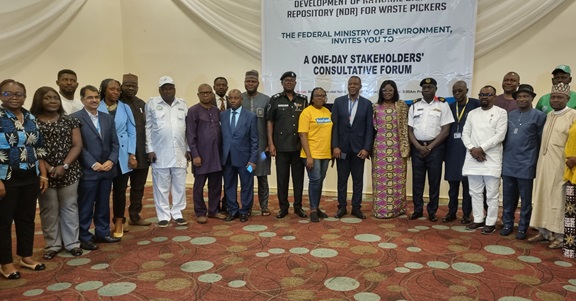
The Federal Government has initiated discussions with the International Labour Organization (ILO), TearFund Nigeria and other key stakeholders to profile legitimate waste pickers and create a digital database to enhance accessibility and accountability.
Speaking at a one-day stakeholders consultative forum on developing a National Digital Repository (NDR) for waste pickers, organised by the Federal Ministry of Environment in partnership with the ILO and TearFund Nigeria, the Minister of Environment, Balarabe Lawal described waste pickers as “unsung heroes” who play a crucial role in the waste management value chain.
“We cannot discuss sustainable waste management without acknowledging the contributions of waste pickers, who are an integral part of this process. These individuals provide essential services that protect our environment and public health, yet they often go unrecognised,” Lawal said.
Lawal emphasised that waste pickers, commonly known as “Baban Bolla,” are vital to waste recovery and contribute significantly to recycling and the circular economy. He noted that they operate in the informal sector, handling all aspects of waste management, including collection, sorting, transportation, processing and the sale of recovered and recyclable materials. Their extensive networks, both within and outside the country, make them indispensable to the waste management value chain.
“The growing demand for recyclable materials and the shift towards a circular economy make it imperative for governments and the public to recognize, regulate, and integrate waste pickers into formal waste management efforts,” he said. “Doing so would unlock significant economic potential, with waste pickers serving as reliable foot soldiers in these initiatives.”
Represented by the ministry’s director of pollution control and environmental health, Omotunde Adeola, Lawal acknowledged the increasing recognition that waste pickers contribute to the local economy, public health, safety and environmental sustainability. However, he noted that they still face challenges such as negative public perception, poor living conditions and limited government support at both national and subnational levels, a situation not unique to Nigeria.
He urged forum participants to actively contribute to discussions to prioritise the welfare of waste pickers and recognise their contributions to environmental sustainability and equitable waste management in Nigeria.
In his welcome address, ILO national project coordinator, Stephen Agugua lamented that, despite their crucial role in environmental and public health, waste pickers often face significant human rights challenges. He highlighted the potential for waste management to create jobs in the circular economy, strengthening local economies and expanding opportunities for decent employment.
“We are at a point where waste is one of the fastest-growing challenges globally, with approximately 2.01 billion metric tonnes of solid waste generated each year,” Agugua said. “Its significant impact on the environment, society, and human health is becoming an increasingly urgent issue, requiring concerted efforts to manage waste effectively using sound practices.”
Agugua stressed that developing a repository for waste pickers in Nigeria will be crucial in addressing the myriad challenges they face. He assured that the ILO and its partners are committed to ensuring a sustainable future that meets the requirements of decent work globally.
In his remarks, Benjamin Osawa from TearFund expressed excitement that Nigeria is considering legitimising the activities of waste pickers, emphasising their critical role in the country’s economic development.
He noted that the stakeholders consultative forum provided an important platform for contributions toward developing a repository for waste pickers, who are essential to both economic development and environmental conservation.
In his goodwill message, UNICEF’s climate change manager, Chiranjibi Tiwin pointed out that Nigeria produces a significant amount of waste each year. He warned that improper waste management could lead to numerous health hazards and environmental risks.
“Waste pickers, who are at the forefront of the waste management cycle—segregation, collection, transportation, processing, reuse, and recycling—are critical to our environmental management and public health,” Tiwin said. “However, they often work informally and under suboptimal conditions, facing significant health risks.”
Tiwin also mentioned UNICEF’s Youth for Climate Action in Nigeria (YOU-CAN) initiative, which aims to involve youth and children in plastic waste management. He expressed UNICEF’s commitment to supporting the workshop and collaborating with stakeholders on this important initiative.


